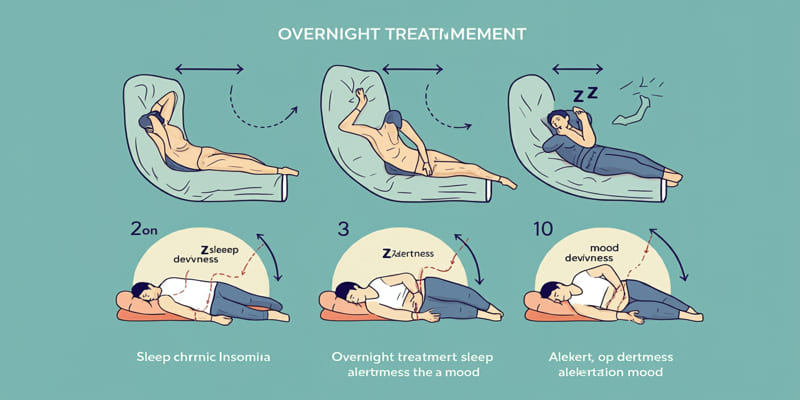Are you fighting chronic insomnia? You are not alone. Millions struggle with this annoying sleep disorder, but effective treatments exist for a good night's sleep. In this article, we will explore evidence-based treatments to finally overcome sleepless nights, from cognitive-behavioral therapy to sleep restriction and relaxation techniques—all based on sleep science that can help.
Understanding Chronic Insomnia

What is Chronic Insomnia?
Chronic insomnia is a long-term sleeping disorder that involves difficulty initiating sleep, maintaining sleep, or both despite adequate sleep opportunities. Other than the occasional sleepless night, chronic insomnia occurs at least three nights a week and has been ongoing for three months or more. It can impact daily life regarding mood, energy level, and overall health.
Common Symptoms and Effects
Individuals with chronic insomnia often experience a range of symptoms, including:
- Difficulty falling asleep at night
- Waking up frequently during the night
- Waking up too early in the morning
- Feeling unrefreshed upon waking
Causes and Risk Factors
Chronic insomnia can be caused by various factors, including:
- Medical conditions (e.g., chronic pain, sleep apnea)
- Medications
- Psychiatric disorders (e.g., depression, anxiety)
- Lifestyle factors (e.g., irregular sleep schedule, excessive caffeine intake)
- Stress and life changes
Cognitive Behavioral Therapy for Insomnia (CBT-I)
CBT-I is one of the most effective non-pharmacological approaches to treating chronic insomnia. It is an evidence-based practice to change the thinking patterns and behaviors perpetuating sleep problems for restful nights and better daytime functioning.
Core Components of CBT-I
Core Elements of CBT-I The main elements of CBT-I usually include the following:
- Sleep education: Learn about sleep hygiene and factors that affect the quality of your sleep.
- Sleep restriction: This temporarily reduces time in bed to improve sleep efficiency and consolidate sleep.
- Control of stimulus: Concern about the association of your bed and bedroom with sleep rather than waking or anxiety.
- Cognitive restructuring: Identify negative thoughts about sleep. Work against it using this technique.
- Relaxation training: Learn methods to physically and mentally reduce tension.
The CBT-I Process
CBT-I usually consists of 6-8 weekly sessions with a trained therapist. These sessions implement strategies to help with your specific sleep issues. You will also keep a sleep diary to track progress and make necessary adjustments.
Effectiveness and Long-term Benefits
Studies have also demonstrated that CBT-I works just as well as sleep medications in the short term but is more effective in the long term. Many patients begin to see significant gains after a few weeks, extending well beyond treatment. Unlike medication, CBT-I addresses the causes of insomnia, providing lifelong skills to deal with sleep challenges.
Medications for Overnight Treatment of Chronic Insomnia

Prescription Sleep Aids
If lifestyle modifications and CBT are not adequate, a physician may consider medications to manage chronic insomnia. The medications tend to induce changes in the brain's chemical levels to lean toward favoring sleep.
Common prescription sleep aids include:
- Benzodiazepines (e.g., temazepam, triazolam)
- Non-benzodiazepine hypnotics (e.g., zolpidem, eszopiclone)
- Melatonin receptor agonists (e.g., ramelteon)
- Orexin receptor antagonists (e.g., suvorexant)
Over-the-Counter Sleep Aids
Mild insomnia is often treated with over-the-counter sleep aids, which typically contain antihistamines that make people drowsy. Common OTC choices are Diphenhydramine (Benadryl, Unisom SleepGels), Doxylamine (Unisom SleepTabs), and Natural Sleep Aids. Some people prefer natural sleep aids over prescription medication. Although studies are continuing, several supplements appear promising for helping sleep quality: Melatonin: Many people take this hormone to help with sleep-wake cycles.
Natural Sleep Supplements
Although studies are continuing, several supplements appear promising for helping sleep quality:
- Melatonin: Many people take this hormone to help with sleep-wake cycles.
- Valerian root: an herbal plant commonly used for its sedation effects
- Magnesium: a mineral that may promote muscle relaxation and calm down the nervous system
Natural Remedies and Lifestyle Changes for Better Sleep
Establish a Consistent Sleep Schedule
One of the best ways to fight chronic insomnia is to have a routine sleep schedule. An internal clock, or circadian rhythm, works on routine. Go to bed and wake up at roughly the same time each day, including weekends. Consistency regulates the body's natural sleep-wake cycle, allowing one to fall asleep and wake up naturally.
Create a Relaxing Bedtime Routine
A sleep-friendly bedtime routine helps the body gauge that sleep time is near. Activities in this category include reading, warm bath time, and light stretches. Avoid stimulating activities, such as watching TV and using gadgets, because screen light interferes with the release of melatonin in your body.
Optimize Your Sleep Environment
Your bedroom is your sleep haven. Keep it calm, dark, and quiet. Invest in a comfortable bed and pillows to support your body. Blackout curtains, white noise machines, or earplugs might help block out bothersome sounds. A clean, relaxed room environment is excellent for sleeping.
Mind Your Diet and Exercise
What you eat and when you exercise can significantly affect how you sleep. Avoid caffeine, large meals near bedtime. Regular exercise can help you sleep better, but finish your workout a few hours before bedtime. For some people, relaxing evening workouts such as yoga or stretches can help induce sleep.
Try Natural Sleep Aids
Some of these natural remedies may enhance sleep. Herbal teas, such as camomile or valerian root, are suitable for relaxation. Magnesium supplements are available, or a diet high in magnesium will help. Essential oils, like lavender, used in a diffuser or sprinkled on the pillow, can help create the right sleeping environment.
Conclusion
Go treatment-seeking for chronic insomnia, fully aware that consistency and further patience await. Practice good sleep hygiene, cognitive behavioral therapy, and medication- if necessary, under medical supervision- to help your brain and body learn about proper sleep. Though changes won't happen overnight, one gets the promise of long-term relief from fewer sleepless nights with one commitment to comprehensive treatment planning.












